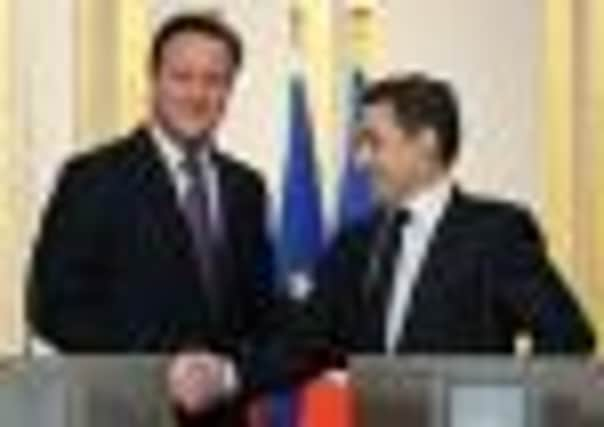UK and France agree deals on military operations and nuclear power


Following wide-ranging talks in Paris yesterday, the Prime Minister praised the president for his “leadership and courage”.
However, he declined to follow German chancellor Angela Merkel’s pledge to help out on the campaign trail, joking he was unlikely to help the French premier in next month’s poll.
Advertisement
Hide AdAdvertisement
Hide AdMr Cameron said: “[The summit] has given me the chance to wish my friend well in the battle he has ahead.”
He added: “I admire Nicolas Sarkozy’s leadership and courage and I think he’s achieved great things with his country and clearly the future is an issue for the French people.
“I make those points but I’m not altogether sure that if I went on the campaign trail in France they might have the effect my friend would want them to have.”
The two men, backed up by senior British cabinet ministers and their French counterparts, made a series of agreements to co-operate on military planning, defence procurement and nuclear power at the UK-France summit yesterday.
During a press conference at the Elysee Palace, the premiers went to great lengths to show relations were warm after terse rhetoric following Mr Cameron’s decision to employ Britain’s veto on a new treaty to stabilise the eurozone last year.
Mr Sarkozy appeared now to defend Mr Cameron’s decision not to commit the UK to the agreement back in December, saying that he may have done the same thing had he been in the Prime Minister’s position.
He added: “We have had divergences of views but perhaps, had I been in David Cameron’s position, I would have defended Britain’s interests in exactly the same way as he has.
“What I can tell you is that there has never been a personal opposition between us. A head of state is there precisely to defend the interests of his nation, to lead others to understand how vital those interests are.”
Advertisement
Hide AdAdvertisement
Hide AdBoth men acknowledged that they have had differences in recent months over the European Union, but Mr Sarkozy insisted “there are more convergences than divergences”.
“I have always been of the view that Europe needs Britain, and, with David Cameron, we are putting together working methods whereby we are going to understand one another’s red lines and come up with a greater degree of convergence,” said Mr Sarkozy.
Yesterday’s summit comes on the first anniversary of the outbreak of the uprising in Libya which led to the toppling of dictator Muammar al-Gaddafi, with the help of a military force in which the UK and France played leading roles.
Among the decisions signed off was an agreement to accelerate plans to create a joint control and command centre for military operations.
That would put in place a rapidly deployable headquarters with a formalised command structure bringing together UK and French forces following joint working in Libya.
The two leaders also agreed to push ahead with the next phase of plans to build a new generation of pilotless fighter aircraft.
The bilateral programme will be worked on by Britain’s BAE and France’s Dassault.
Mr Cameron said: “I don’t think that there has been closer French-British co-operation at any time since the Second World War, not just in Libya but also on the vital issues of Syria, Iran, Somalia and defence co-operation.
Advertisement
Hide AdAdvertisement
Hide Ad“We are similar-sized powers, with similar-sized armed forces, with similar ambitions.
“It is partly about new capacity – the investment that we are going to make in a drone programme. It is also about making the most of our existing capacity, as we will be combining and using it together..
“And it also covers the most sensitive defence areas of all, including, of course, the nuclear issue.”
The Prime Minister and Mr Sarkozy said Britain and France would continue to co-operate on the crisis in Syria and offer their support to the Friends of Syria group, which has its first meeting in Tunisia next week.
Mr Cameron announced that Britain is sending food rations to help 20,000 people in Syria, while Mr Sarkozy denounced president Bashar Assad’s crackdown on protests against his regime as “scandalous”.
Britain and France also signed a landmark agreement to co-operate on civil nuclear energy, paving the way for the construction of a new generation of power plants in the UK.
The deal between Rolls-Royce and Areva would see 1,500 jobs created in the UK and £100 million invested across the south-west of England and a new factory in Rotherham, South Yorkshire.
The factory will produce components for the first new nuclear plant at Hinkley Point in Somerset, as part of a £400m deal with Areva, supporting 600 jobs in the company and 600 in its supply chain.
Advertisement
Hide AdAdvertisement
Hide AdMr Cameron added: “The strength of a relationship is when you can have disagreements but actually go on working together on all the areas where you agree. If you look at the detail of what Britain and France are doing together on defence co-operation, not just building new drones together but co-operating on the most sensitive dossiers of all, including nuclear, I think that demonstrates an incredibly strong relationship based on our countries’ shared interests.”
Mr Cameron added: “I believe it is a relationship that is easily strong enough to survive the odd bump that we sometimes have when we have a disagreement. That is what politicians do and it is what friends do as well.”